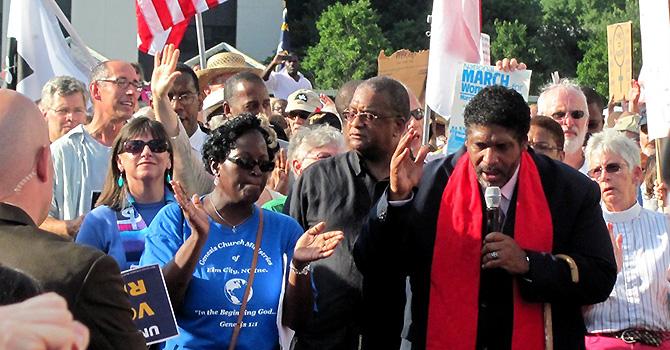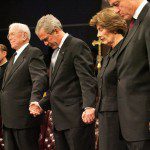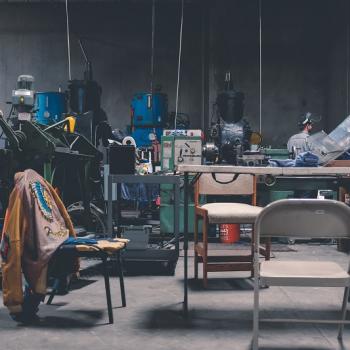
In this interview, the leader of the Moral Mondays movement talks about leading in the public square. Reprinted from Faith&Leadership.
The Rev. Dr. William J. Barber II is the president of the North Carolina NAACP and architect of the Moral Mondays protest movement, which began in Raleigh in 2013 and has spread across the country.
Barber has been engaged in social activism for many years, but he began his rise to national prominence after organizing a 2007 coalition of advocacy groups called the Historic Thousands on Jones Street People’s Assembly (HKonJ), which marched on the state Capitol to protest conservative legislation.
Out of that grew the Forward Together Moral Movement, which organized Monday protests and civil disobedience at the state legislature building. In North Carolina, redistricting and proposed voting rights legislation have been a particular focus for progressives. The Monday protests, known as “Moral Mondays,” have spread to other states.
Barber spoke at the 2016 Democratic National Convention, where he urged voters to “embrace” Hillary Clinton.
“If you’re going to be in the public square as a preacher, you have to bring something different. So, for instance, you’ll never hear me in the public square talking about left and right, and Conservative vs. Democrat,” he said. “You have to bring to bear the sacred text in the public square.”
Barber also is the pastor of Greenleaf Christian Church (Disciples of Christ) in Goldsboro, North Carolina, which has invested $1.5 million into community development, including low-income housing, a home for senior citizens, a preschool and a community center.
Barber received an M.Div. from Duke Divinity School and a doctoral degree from Drew University. He is the recipient of the Order of the Long Leaf Pine, North Carolina’s highest citizenship award.
He was interviewed for Faith & Leadership by Jonathan Wilson-Hartgrove, who co-wrote with Barber the book “The Third Reconstruction: Moral Mondays, Fusion Politics, and the Rise of a New Justice Movement.”
Q: What can institutional church leaders do to address issues of systemic injustice?
I’m certainly a part of the institutional church. I’m in the Christian Church (Disciples of Christ) — I’ve been a pastor for nearly 30 years. I’m a part of a denomination that is 95 percent white, 5 percent Latino and African-American. I’m a moderator of the Christian Church (Disciples of Christ) in North Carolina, which is over 125 churches, the majority of which are white.
I think the first thing — and this might seem simplistic — is we have to begin to preach the gospel in our churches. Not merely attempt to quarantine the church from the issues in the world but to have the courage, as Karl Barth once said, to hold the Bible in one hand and the newspaper in the other.
I think too many of our pulpits are disconnected from the realities that people are facing every day. When you look at the ministry of Jesus or the ministry of the prophets, there was a certain Sitz im Leben, if you will. There was a certain recognition of the context of the time that they were spoken to.
For instance, Philip Esler, in one of his books, “Community and Gospel in Luke-Acts,” talks about how you can hear in Jesus’ first sermon Jesus directly contrasting Roman society, the stratification, and the poverty. Jesus gives priority and place to the poor, the very ones that Roman society and the religious cultures of that time dismissed and pushed aside.
We cannot be silent on the issue, for instance, of unarmed black and white, black men, women and children being shot.
We cannot be silent and not talk about what the gospel says when we have 14.7 million poor children in this country.
We cannot be silent in our pulpits or in our Bible studies when 64 million Americans make less than a living wage in a time when 400 families make over $97,000 an hour and 54 percent of African-Americans make less than a living wage.
We have to begin to deal with race from the perspective of the gospel, and we have to deal with race not merely as a feeling of prejudice but to unpack for people in the pews that racism is about power.
It’s not so much what’s in somebody’s heart personally but what is the heart of their policies.
And so we have to dare to preach the gospel. We have to dare like Isaiah to cry out, “Spare not!” We have to dare like Jesus to call religious hypocrisy what it is when we major in everything else but love, justice and mercy.
And I think that until we, like Jesus, come preaching, then there will always be a certain anemia as it relates to the church’s ability to deal with these issues internally. Because if we’re afraid to deal with these issues internally, then how can we ever be prophetic externally?
Q: I’ve talked to a lot of white pastors and church leaders who are feeling that they need to do something and they don’t feel like they know how. What resources or partners would you point institutional leaders toward?
Well, I certainly would point them to the piece, Jonathan, that you helped to edit, which is “A Liturgy for Ordinary Radicals.”
I think we would do well to go back and read the writings of people like William Lloyd Garrison and Charles Finney.
I think we would do ourselves well to recover the language of Howard Thurman — “Jesus and the Disinherited,” for instance. Certainly, the writings of Dr. [Martin Luther] King and Rabbi [Abraham Joshua] Heschel. And I was just reading this morning Sojourner Truth.
I think we would do well to start with people who gathered themselves, and gathered their consciousness, and chose to preach the gospel in times much worse than the times in which we live.
Because when we want to be fearful, we should look back and remember that William Lloyd Garrison and Henry Thoreau were thrown in jail for preaching [truth]. In fact, William Lloyd Garrison wrote on the wall of his jail cell, “William Lloyd Garrison was put into this cell … for preaching the [abominable and dangerous doctrine] that all men are created equal.”
I think of pieces like “America’s Original Sin” by Jim Wallis, the writings of Dr. King, especially his last book, “Where Do We Go from Here: Chaos or Community?”
I would recommend the book that I’ve written called “Forward Together: A Moral Message for the Nation,” where it shows messages in the public square that whites, blacks, brown people, Asians and others were able to hear. Or “The Third Reconstruction” that we wrote together, Jonathan. I think those are important pieces.
And I think that we should not just preach it but teach it in our Bible studies. The National Council of Churches has a series of Bible studies that can be engaged in.
But I also think we have to learn how to bring testimonies in the church, the testimonies of real people.
So, for instance, the third weekend in October and the first weekend in November, we [the ecumenical Moral Revival project] have asked rabbis, imams and pastors to preach on social justice, love and mercy. But bring someone in, for instance, who has been denied health care, and before they preach the sermon, let them testify.
Or bring someone in that has been impacted by police brutality, or show a film of someone, so that it’s not abstract.
And then last, I would encourage every minister of the gospel to pick up a copy of the Poverty and Justice Bible. I think it is an invaluable tool, because in that Bible, they mark every scripture that has to do with love, justice and mercy — over 2,000 scriptures.
In fact, I’m thinking that I’m going to replace the pew Bibles at my church with that Bible, because it drives home so clearly that if you do not deal with the issues of love, justice and mercy, it’s like taking a pair of scissors and cutting the Bible up, and you have nothing left.













